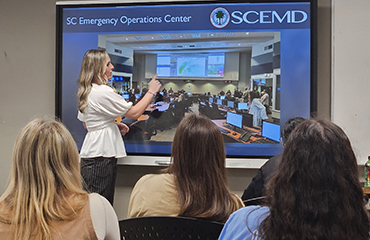
Lander University alumna Macy Sinner is a mitigation specialist with South Carolina’s Emergency Management Division. She spoke to students at Lander about disaster relief efforts in the Palmetto State and career opportunities for emergency management graduates. Photo by Karen Petit
Reducing long-term risks from hazards, including earthquakes, tornadoes, hurricanes and floods which have devastated parts of South Carolina throughout history, is the job of the state’s emergency management mitigation experts.
In a class for Lander University undergraduate students, being taught by Dr. Mattew Malone, an associate professor of political science and homeland security, two of South Carolina’s mitigation leaders discussed a wide range of disaster topics. The classroom discussion included the 1886 Charleston earthquake, Hurricane Hugo in 1989, the historic floods of 2015 and last year’s tornado in the small town of Bamberg.
Tyler Spires, the state hazard mitigation officer for the South Carolina Emergency Management Division (SCEMD), joined Lander alumna Macy Sinner, ’21 and ’23, a hazard mitigation specialist with SCEMD, to talk about careers in emergency management and the rewards of working in a field that is constantly changing.
“We work to save lives and property and to also reduce the impact from disasters,” said Spires. “Mitigation efforts never end. We are always looking at what’s impacting our area … each community can be affected by a disaster, and the damage can be overwhelming. We never know what’s going to happen next.”
Sinner, who earned a bachelor’s degree in criminology and sociology and a master’s degree in emergency management from Lander, called her job “very rewarding.” She provided an overview of the types of projects she has worked on, including an emergency management plan for Charleston that focused on the city’s historic buildings.
She said students interested in emergency management careers should “work hard now” in preparation for their future and to take advantage of resources available at Lander to help them, such as the writing lab and Student Success Center.
“If you know what you want to do, apply for jobs three to four months out before you graduate,” she said, encouraging students to consider Lander’s online master’s degree program in emergency management. “I am very grateful to have earned my master’s degree here at Lander. I received reduced tuition and a stipend as a graduate assistant. This helped me afford my graduate degree.”
Spires said that emergency management “is a growing field, and we are always looking for talented people to work with us. A master’s degree program will open many doors for you and open opportunities for your future. Had I not had a master’s degree, I would not be in the job that I’m in now.”